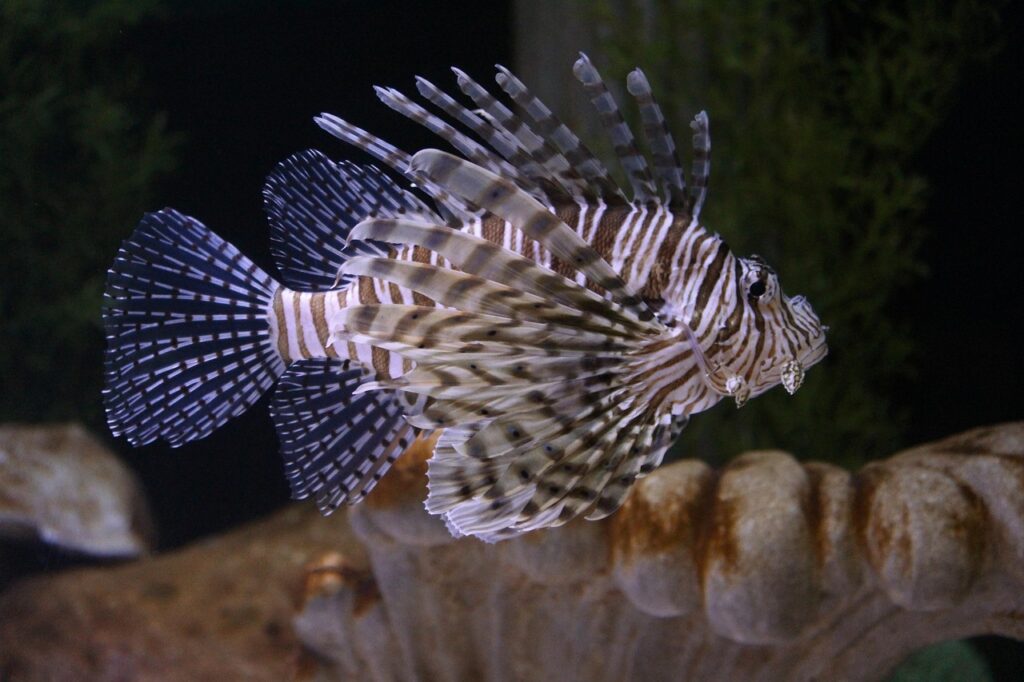Beauty and the Beast: The Lionfish Invasion

Lionfish are a captivating sight with their unmistakable stripes and venomous spines (resembling a lion’s mane). As you’re already aware, beneath their beauty lies an ongoing threat to marine ecosystems, especially our reefs. Let’s dive deeper into this invasive species to better understand their threat and what the diving community can do to help defend our beloved reefs.
Lionfish are native to the Indo-Pacific, but have swept across the Atlantic Ocean (as far north as Massachusetts), Gulf of Mexico, and the Caribbean Sea. The prevailing thought is they were introduced to these waters through aquarium releases and have since proliferated due to lack of natural predators and aggressive breeding. A single female can produce up to two million eggs annually.
While not very picky eaters, lionfish have a voracious appetite, and compete with native species for food, often opting for young juveniles. The problem gets much worse as they target fish that eat algae, the base of the reef’s incredibly delicate ecosystem. Without fish to eat the algae, the algae is free to grow unchecked, and eventually that growth covers the corals, effectively suffocating the reef.
Quick recap of how we got here and the problem: Exotic pets were dumped in the ocean and started multiplying at rates that would make a jackrabbit blush. They have no natural predators and eat the baby fish responsible for algae control, leading to uncontrolled algae overgrowth, and eventually dead reefs.
So what’s the potential impact?
To start, coral reefs are crucial for ocean life as they provide habitat for 25% of all marine species. But failing to address the invasion has dire consequences not only for marine biodiversity, but for the local communities that rely on reefs to support their economies.
Healthy reefs attract tourists for diving and snorkeling, generating revenue for coastal communities. Additionally, fisheries suffer as lionfish deplete populations of commercially important species, affecting the livelihoods of fishermen and reducing n important food source. A decline in reef health can lead to reduced tourism and economic hardship.
Divers can play a vital role in controlling the lionfish population and protecting coral reefs. Here are some ways to get involved:
- Learn How to Safely Catch Lionfish: If you’re an experienced diver, consider learning how to safely catch and remove lionfish. Specialized raining programs teach proper techniques, safety precautions, and use of spears and containers for handling these venomous fish. Removing lionfish during your dives can make a significant impact for the reefs. Take that a step further and:
- Participate in Lionfish Derbies and Removal Programs: Many coastal communities organize lionfish hunting events and removal programs. These events help reduce lionfish numbers and raise awareness about the issue. Lionfish derbies are often structured as competitions, where divers collect as many lionfish as possible within a set period. Prizes are awarded for the largest, smallest, and most lionfish caught. These events can be both fun and effective, fostering a sense of purpose among divers, and typically involves a tasty meal for the community. Take that step further and:
- Promote Lionfish as a Sustainable Seafood Choice: Another way to combat the lionfish invasion is to create a demand for them as a food source. Lionfish are delicious and can be prepared in various ways. By promoting lionfish cuisine at local restaurants and markets, you help create an economic incentive for their removal. Consider working with local chefs to introduce lionfish dishes to their menus. Some restaurants will even pay you for your fish! Highlighting the culinary benefits of lionfish can help shift perceptions and encourage wider consumption.
- Educate Others: Raise awareness about the lionfish invasion among your diving peers and the broader community. Share information on social media, participate in local education programs, and encourage others to get involved in conservation efforts. Consider getting involved at dive clubs. The more people understand the issue, the more collective action can be taken to address it.
- Support Marine Conservation Organizations: Many organizations are dedicated to addressing the lionfish problem and protecting marine ecosystems. Supporting these groups through donations, volunteering, or advocacy can amplify their efforts and drive broader changes. Organizations like REEF (Reef Environmental Education Foundation) and NOAA (National Oceanic and Atmospheric Administration) have ongoing lionfish programs that rely on public support. Or, check out our Dead Lion Collection at DESCEND!

Taking action against the lionfish invasion is crucial for preserving the health and biodiversity of our coral reefs. By addressing the problem now, we can help ensure that future generations can enjoy these vibrant ecosystems. As divers, we have a unique opportunity and responsibility to protect the underwater world we cherish. Let’s dive in and make a difference.

